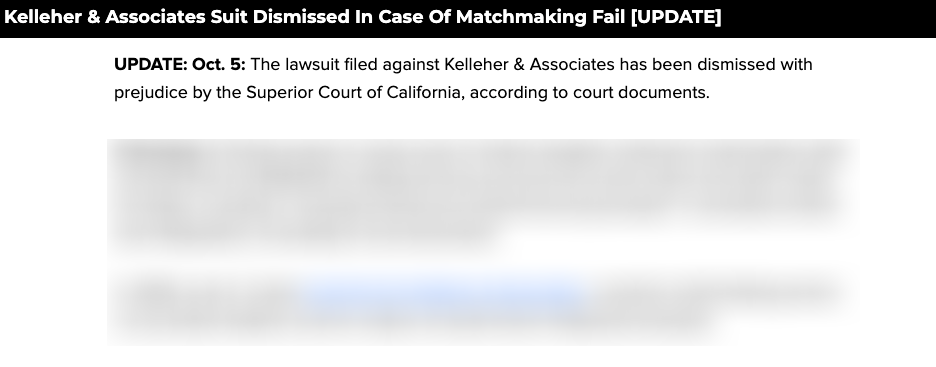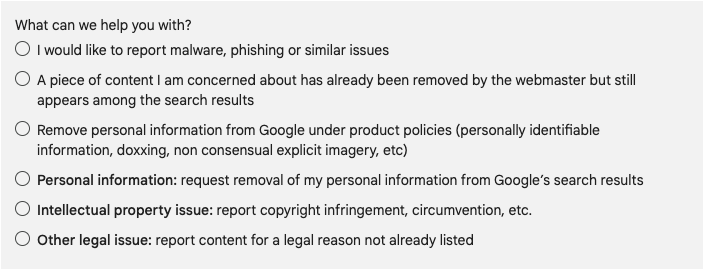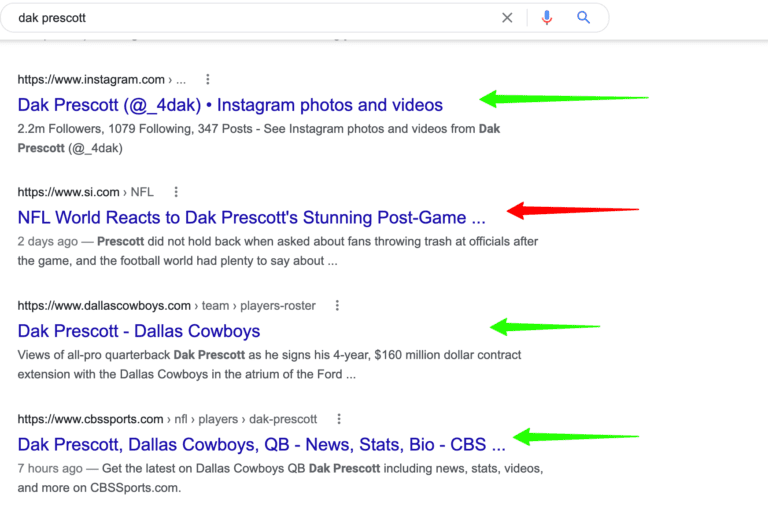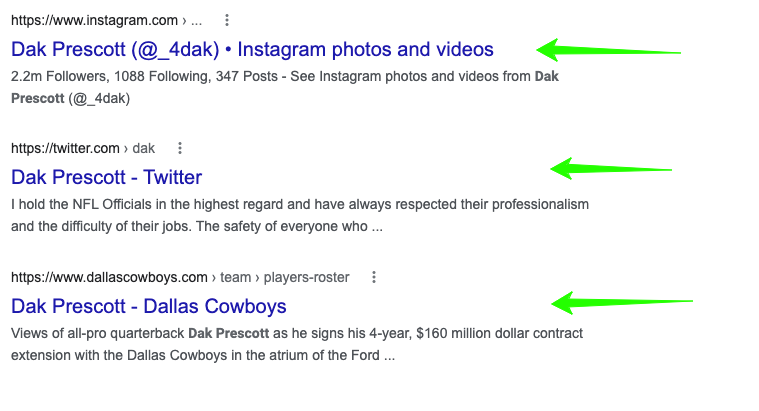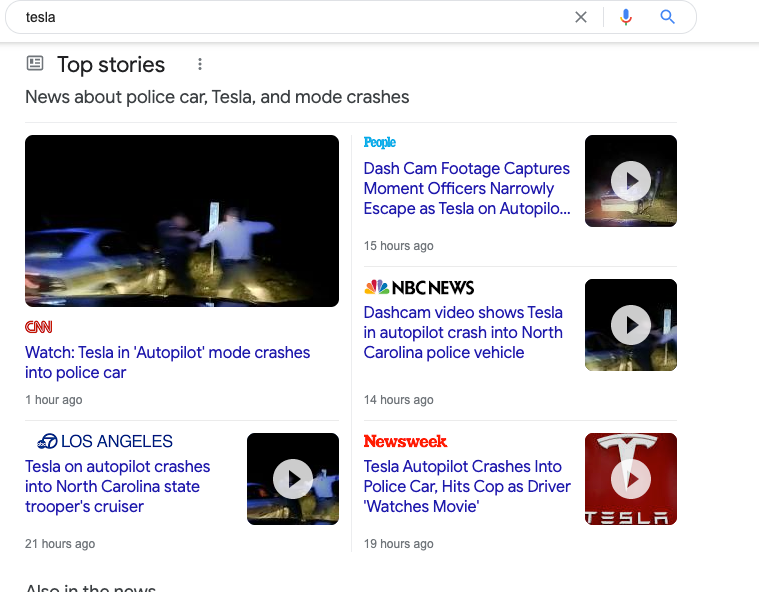Table of Contents
As more users move to search engines to learn information and perform research, online reputation management is becoming increasingly important. This means understanding how your presence and sentiment look in the Google search results. At Go Fish Digital, our research has shown that just one negative article can result in businesses risking losing up to 22% of customers.
Related Content:
- Online Reputation Management
- Online Reviews Management
- Search Suppression Services
- Yelp Review Management
This means that even one negative news article can be damaging to both your reputation and your business. To make matters worse, the negative coverage can stick around on the first page of Google for a while, even long after the event has passed.
However, there are steps you can take to remove the article or reduce the damage it does to your reputation. This guide illustrates how we help our clients remove negative news articles from search engines.
Why Do News Articles Rank So Well?
So when looking at search results tied to your online reputation, why do news articles tend to rank so well? News articles can rank very easily after their date of publication and stick around in the top results for longer periods of time.
The main reason news articles rank well is because of the websites these articles are on. One of the most prominent Google ranking factors is the amount of links that a particular website has. Simply put, the more links a website has, the better the pages on that site will rank in the search engines.
News sites are some of the most powerful sites on the web due to the amount of links they attract. Since news stories are highly shareable content by their nature, they tend to generate a lot of coverage (and thus links) from other places on the web. When a news story goes live, that story can be shared in many places, such as personal blogs, other news sites, syndicated articles, and many other places.
We can use a site’s “Domain Authority” as an estimate of how powerful a particular site is on the web. While not officially used by Google, this can provide a rough estimate of how strong a site is based on its total number of links. Domain Authority is assessed in a score from 0 to 100. Sites above an 80+ Domain Authority are generally considered to be among the most powerful sites on the web.
When looking at national publications, we can see that almost all of the top sites have 90+ Domain Authority scores:
- USA Today: 94 DA
- The Wall Street Journal: 94 DA
- The New York Times: 95 DA
- The New York Post: 93 DA
- Los Angeles Times: 93 DA
Even when drilling down to local media outlets, we can still see very strong Domain Authority scores. Since we’re located in Raleigh, NC, we pulled some examples of the Domain Authorities from larger local outlets:
- The News & Observer: 81 DA
- WRAL: 82 DA
- CBS 17: 77 DA
- ABC 11: 81 DA
With this data, it’s easy to see why news articles rank so well. In general, publisher sites have some of the strongest sites in the entire web. This means that articles posted on these sites can easily rank for less competitive keywords with little effort. While this is great for these sites, it can be less than ideal when a negative piece of coverage is written that ranks for keywords pertaining to your online reputation.
How Do You Remove Negative News Articles From Google Search?
You can try to remove negative news articles from Google search by requesting the journalist take down the article. Other methods of removing negative articles include using Google’s DMCA form, giving the article time to fall off of the first page or suppressing the article. Below you can find more information on each of these methods and how you can use them to improve your online reputation.
1. Request the Journalist Remove the Article
The first step to take is to try to reach out to the journalist that wrote the article and request removal. This is the ideal action, since deletion of the article will result in the removal of the page from the search engines, as they should encounter 404 pages over time. As well, removing the article on the publication’s site will ensure that users aren’t able to find it there either.
To start this step, you’ll want to first find the journalist’s contact information. While this can be difficult to do, there are some ways to accomplish this:
- Review their journalist author page to see if they list an email address.
- Find their Twitter profile and run it through AllMyTweets to see if they list it there.
- Look for a “Contact” page on the publication’s website.
- Use a large media database. We’re big fans of Cision.
- Use tools such as Hunter.io to use the journalist’s name and website.
- Extrapolate based on other publicly available emails. For instance, if you see that the people on the website have an email format using firstname.lastname@domain.com, try using that same pattern.
If you get in contact with a journalist, always be respectful with your request. Upsetting them will likely just exacerbate the situation and make it even less likely they’ll remove the article.
If you’re not able to find contact information for the exact journalist, try reaching out to their managing editor instead. They may be more likely to respond to inquiries about previously published articles.
2. Request an Update to the Article
Unfortunately, most times we’ve found that journalists and publications are unwilling to outright remove articles from their websites. However, with clients in the past, we’ve had some success getting journalists to provide updates to articles.
For example, here you can see how The Huffington Post provided an update at the top of this negative news story.
While this doesn’t completely remove the article from the publication or search engines, it can help mitigate the reputational damage that’s done. These updates can help inform users of the recent events of a negative news article, and they then know that the claims and allegations have been ruled as false.
Generally, to get journalists to update articles, you’ll need to provide some type of proof. For our clients, we’ve been able to get journalists to publish these updates after providing court documentation and stories on other news outlets that show that particular lawsuits were dropped or proven to be without merit.
3. Fill Out Google’s DMCA Form
When looking for options to remove negative news articles from Google, you can also try completing Google’s DMCA Form. This is a form that Google offers where you can request that content be removed from the search engine for a variety of reasons.
Using this form, you can cite one of the reasons you think the negative news article violates and request that Google remove the content. If successful, this would prevent the negative article from appearing from Google’s search results. However, the article would remain present on the source publication.
For the EU, another interesting aspect of Google’s legal documentation around this topic is the “Right to Be Forgotten” which states:
“The “right to be forgotten” is a common name for a right that was first established in May 2014 in the European Union as the result of a ruling by the European Court of Justice. The Court found that European data protection law gives individuals the right to ask search engines like Google to delist certain results for queries related to a person’s name. In deciding what to delist, search engines must consider if the information in question is “inaccurate, inadequate, irrelevant or excessive,” and whether there is a public interest in the information remaining available in search results.”
If you feel that the result is “inaccurate, inadequate, irrelevant or excessive” you can fill out this form to request that Google removes the content. Google will then evaluate your request based on a number of factors such as your notoriety to the public, how old the content is, how truthful the content is, among other factors.
4. Give the Article Time to Fall off of the First Page
Depending on how recent the negative news article is, simply waiting for the content to fall off the first page of Google could be an acceptable solution. When determining it’s rankings Google uses freshness as one of its ranking signals. This means that news articles that have been more recently published will oftentimes temporarily rank on the first page due to their recency. It’s almost as if Google is a newspaper that shows the most popular headlines around a topic for a short period of time.
For example, after a recent playoff loss, Dak Prescott made some comments in his post game press conference that ended up getting a negative news article written. Immediately following the game, the page was ranking in the first page of Google.
However, weeks after the loss we can see that the article has fallen off the first page of the Google search results.
Since the article became outdated and no longer as relevant to searchers over time, we can see that Google has completely removed it. In a sense, the article has “expired” off of the first page.
In general, the more public notoriety your name or company has, the more likely it is that negative news articles will expire off the first page in time. However, this might not work for less notable figures where a negative news article is one of the few articles online about them.
5. Create Positive News Stories
Another great strategy to help suppress negative news articles is to quickly get back in the news cycle, except in a positive way. This can help push any negative news articles off of the first page of Google and associate searches for a name or company with more positive content.
As we just discussed, Google takes “freshness” into consideration with the content that it ranks. Articles published more recently are going to be more likely to rank well. This is an attempt from Google to better capture trends for users and give people a more social media-like experience.
If you have a negative news article ranking well, you can use Google’s freshness algorithm to your advantage. By getting yourself back in the news cycle, new content will be created that’s capable of ranking in the search engines. Since this content will be newer than the negative coverage, this can help push out the negative articles. As a result, users should see the new positive coverage when searching for your core keywords.
For example, here’s what Google is showing when a user searches for “tesla” in early February 2022. We can see that most of the coverage contains negative articles about an accident that vehicle in autopilot had with a police car.
However, later in February 2022, we can see that searches for the term “tesla” return much more positive articles. The company was able to quickly hit the news cycle again in a more positive way. Now all of Google’s Top Stories are showing articles about Elon Musk’s recent donation of $5.7 billion in Tesla stocks.
With this new coverage, Tesla has completely removed all of the negative information off the first page of Google. These new articles contain a much more positive brand sentiment than the ones that were previously ranking.
While it’s extremely likely that you won’t be able to control the news cycle as much as a company like Tesla, we’ve seen this strategy for higher influence companies and people. We’ve seen many examples where a large company or celebrity receives negative press but then quickly inserts themselves back into the new cycle in a positive way. This results in more positive articles being written about them and helps significantly mitigate the reputational damage done by negative news articles.
6. Suppress the Negative News Article
Unfortunately, what we’ve found in our experience is that journalists and Google are often unwilling to remove negative news articles from their respective platforms. As well, sometimes articles will naturally move off the first page, but many people and brands aren’t able to move the news cycle enough to make the negative coverage go away.
In these events, your best option is to suppress the negative news article. Search suppression is when you take actions to improve the rankings of other results, pushing the negative article off the first page of Google. While the article won’t be removed from the search engines, you’ll significantly decrease the number of people who see the result. This is because very few people actually click to the second page of the results.
In another article, we have written out our process on how we suppress negative content from the search results. While we won’t completely reiterate the process, the basic steps include:
- Tracking the keywords associated with negative content
- Identifying positive, neutral, and negative articles in the search results
- Optimizing existing articles for your target keywords
- Creating new content optimized for your target keywords (social profiles, third party contributions, personal sites)
- Linking to any positive and neutral articles from owned content
Following this process, we’ve been able to help clients suppress negative news articles in the search results. In the below screenshot, you can see one of our client’s baseline search results by sentiment. Positive articles are green, neutral articles are blue, and negative articles are red:
By implementing the search suppression methods, we were able to push down all of the negative articles off the first page of Google.
As a result, this was a large step towards repairing this client’s online reputation and improving the user sentiment in the search results.
Conclusion
Negative news results can definitely have an adverse impact on both your reputation and your business. Fortunately, there are steps that you can take to mitigate the damage that this type of coverage has on your online reputation. By following the steps above, you might be able to get the news article suppressed from the first page of Google or even outright removed.
If you see negative results that you’re looking to bury, check out our search suppression services at Go Fish Digital.
Search News Straight To Your Inbox
*Required
Join thousands of marketers to get the best search news in under 5 minutes. Get resources, tips and more with The Splash newsletter:
